Nineteen Sixty-Eight began with the Têt offensive, when the Vietnamese national liberation struggle suddenly showed its strength as a military force, though it was eventually beaten back into guerrilla warfare. The images of burning villages and burning children were seared into the consciousness of millions of people around the world. In the United States, Martin Luther King, whose call for an end of the war clearly linked the anti-war cause to the battle for civil rights, was assassinated on April 4.
In France, reactions to the U.S. war in Vietnam, a former French colony, were viscerally linked to the war in Algeria, which was fresh in people’s memories. For those who had supported Algerian independence from France, achieved only six years earlier, the Vietnamese people’s struggle for independence was a natural follow-on.
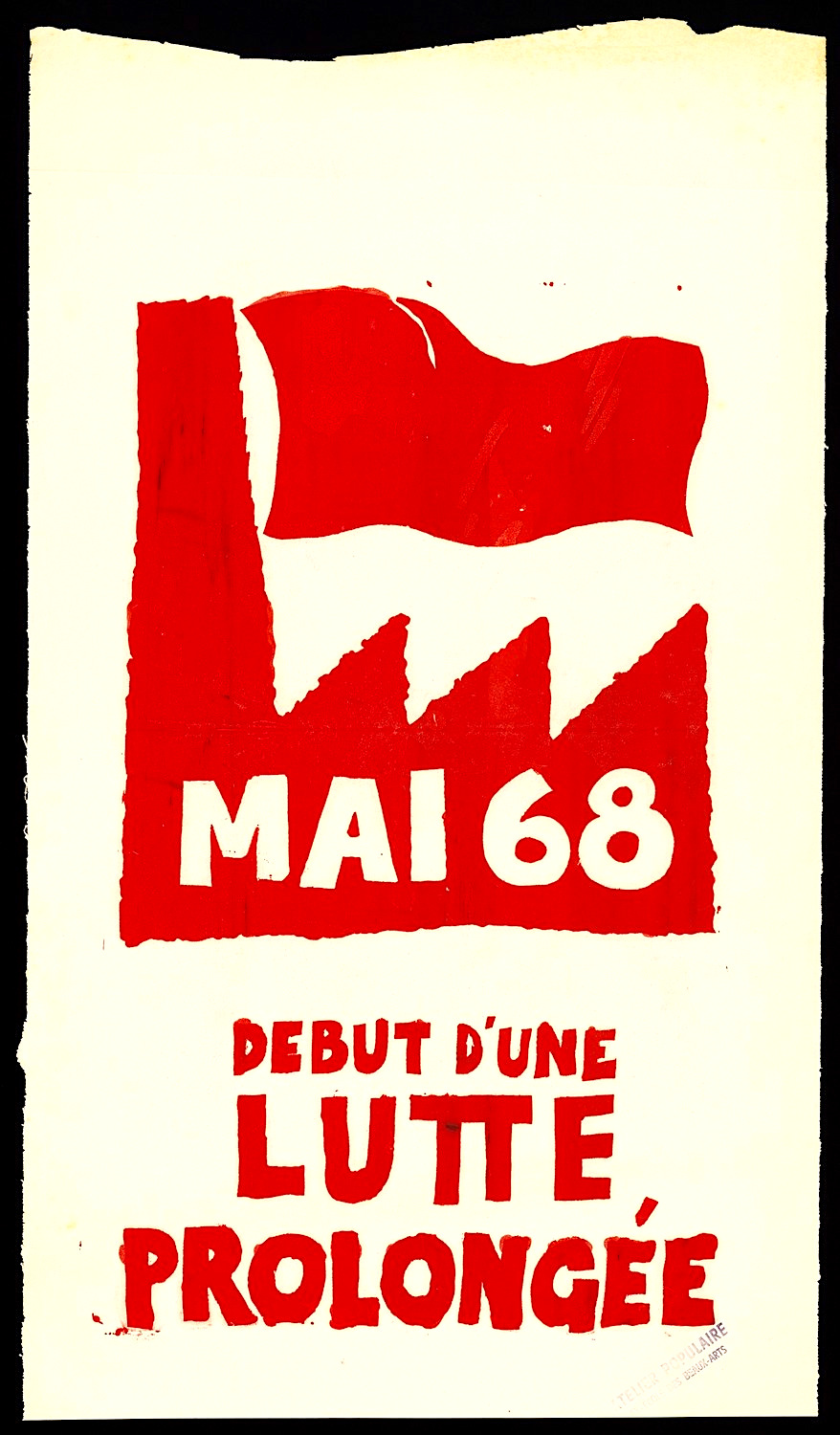 If anything, the Vietnamese victory was even more clearly just and inevitable. On the other side were a smaller number of diehard colonialists who hated Charles de Gaulle for giving Algeria away and dismantling the French Empire. The youth group “Occident”, rooted mainly in the law faculty in the rue d’Assas, organized commando groups to defend ill-defined “Western values” which they considered under threat.
If anything, the Vietnamese victory was even more clearly just and inevitable. On the other side were a smaller number of diehard colonialists who hated Charles de Gaulle for giving Algeria away and dismantling the French Empire. The youth group “Occident”, rooted mainly in the law faculty in the rue d’Assas, organized commando groups to defend ill-defined “Western values” which they considered under threat.
One evening, to my great surprise, I turned out to be one of those “threats.” As I arrived late to take part in an anti-war panel in Saint Germain en Laye, near Paris, I smiled at a small group of men standing at the entrance who proceeded to knock me flat and bleeding, leaving a few of my teeth loose. That was my informal introduction to “Occident”. This sort of encounter heightened tensions, and leftist groups strengthened their services d’ordre in self-protection.
Such minor incidents concerning Vietnam helped set the mood for the street fights that inflamed the Latin Quarter in the early days of May 1968.
The revolt broke out on May 3 after police entered the sanctuary of the Sorbonne and arrested student leaders protesting the shutdown of the university at suburban Nanterre. I don’t think that at the time many people cared about the problem at Nanterre. But the sight of police occupying the Sorbonne aroused protests, and in the streets, police charged protesters.
Some ran for cover, but many fought back with surprising determination. After several days violent skirmishes grew between groups of students and baton-wielding security policy, the Compagnies Républicaines de Sécurité (CRS), which was met with the slogan “CRS SS!”
A State of Siege
Within a week the entire Latin Quarter was in a state of siege. May 10 was the “night of the barricades”. I happened to be there, in the streets near the Pantheon, and was struck by what seemed to me a certain mimesis.
All night, students around the Pantheon calmly built barricades, passing the paving stones from hand to hand with the same gestures they had seen in the 16-millimeter films of Vietnamese peasant women rebuilding bombed dikes.
The next day, the streets were cluttered with debris from the police charge. The Latin Quarter was occupied by rows of armed CRS, and students who had been apolitical a few days before wandered in a new landscape, transformed into an oppressed people with an occupation army to overthrow. Was there some latent desire to be like the Vietnamese, who at the time were the object of widespread sympathy and admiration – even adoration?
In between my library research and my part-time work for a movie dubbing studio, I followed those events unroll as closely as I could. I was present at many of the key happenings, the major skirmishes in the Latin Quarter, the orations at the Odéon theatre, the night of the barricades, the big marches, the speech at the Sorbonne of the student leader Daniel Cohn-Bendit on his triumphant return after being expelled to Germany. I rushed to buy every edition of the daily “Action.” Yes, I was there.
But did I understand what it all meant? Hardly. Do I understand now? A little better, I think. But the French May ’68 was too ambiguous and contradictory to be easily understood. I would even venture to say that nobody did, or could, fully understand its meaning because there were so many actors performing out of different motivations, often obscure even to themselves.
I recall overhearing a chic young woman in a shop in Saint Germain des Près remark to the clerk that she had to rush to finish her shopping in order to “get back to making the revolution.”
Paris was nearly the last student population in the world to get into the spirit of the times. The revolt grew when French workers and labor unions joined the students. But such was the mystique of Paris, capital of revolution, that it was only when students in Milan or Berlin heard of the Paris events that they thought something truly momentous was happening. Many set out on pilgrimage for Paris heedless of transport strikes and gasoline shortages, to join the revolution in the Sorbonne.
However it may be interpreted, the massive French revolt of May 1968 quickly became the symbol of an era. The “events”, as they were called at the time, featuring an ephemeral revolution at the Sorbonne and the biggest general strike in French history, momentarily created the illusion of Paris as center of a worldwide revolution.
The Walls That Spoke
The extreme ambiguity of the Paris revolt was expressed in the graffiti slogans that appeared on walls around the city as if by magic. The walls seemed to talk – and indeed that was one of the slogans: “Les murs ont la parole.” It seemed that the walls themselves were announcing a new dispensation: “It is forbidden to forbid,” and in allusion to the paving stones being hurled at police, “Sous les pavés la plage” (under the paving stones the beach). Enjoyment without limits was the dominant message, down with authority of all kinds, down with work, “L’imagination prend le pouvoir” (imagination takes power), “Be realistic, demand the impossible!”
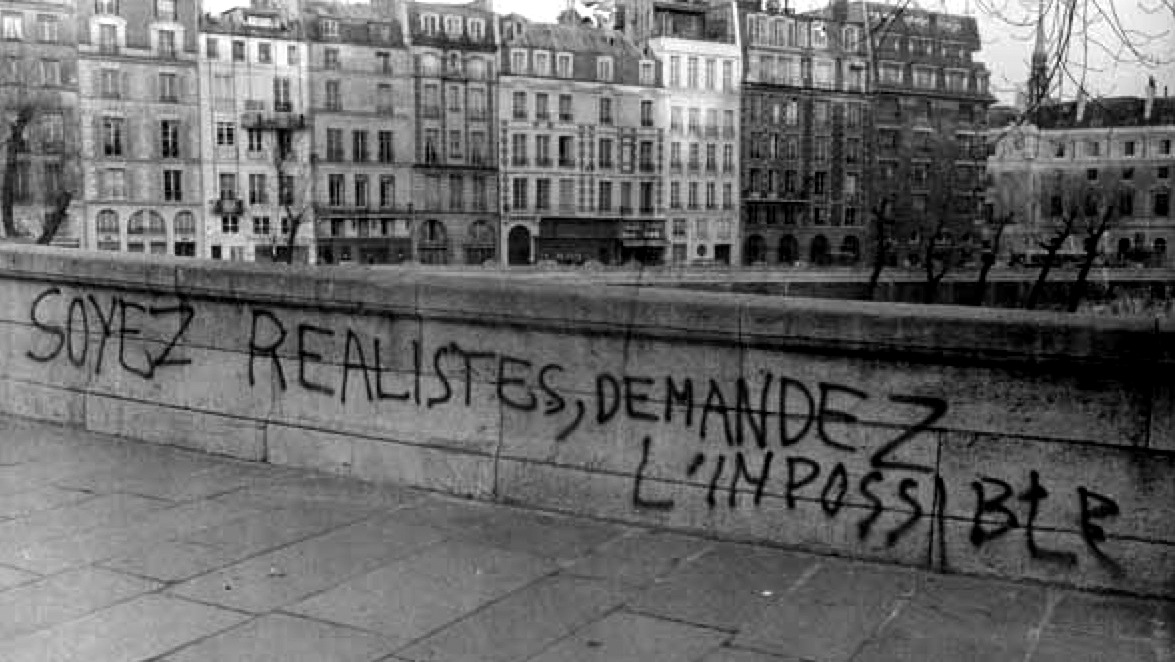
The myth of the spontaneous talking walls overlooked the fact that the most striking slogans were directly inspired by a group of radical libertarian theorists calling themselves the Situationists. Their best known exponents were Guy Debord, author of La Société du Spectacle, and Raoul Vaneigem, author of a “Traité de savoir vivre à l’usage des jeunes générations,” which exhorted the young to total revolt against existing society.
Like other radicals of the period, Situationists considered genuine, non-existent socialism (as opposed to the Soviet variety of “real existing” but false socialism) to be the ultimate goal of social revolution. But their immediate target was “consumer society” and what Debord called “the spectacle society.”
In May ’68, they had the situation of their dreams. Their triumph was fleeting and deeply ironic. The social liberation that ensued paved the way to a far greater alienation in terms of consumerism and commercial spectacle than ever. May ‘68 itself was exactly the opposite of what it seemed at the time.
The hedonistic spirit or “it is forbidden to forbid” was represented by the student rebel who came to personify May ’68, Cohn-Bendit. A news photograph showing him staring impertinently into the face of a helmeted police officer at short range was a perfect image of cheeky defiance of skittish authority. For the media, it was love at first sight, and a love that lasted.
Cohn-Bendit was nicknamed by the media “Dany the Red”. While it may have applied to his hair color, it did not fit his politics, insofar as “red” denotes communist or socialist. While loosely attached to the Anarchist Federation, Cohn-Bendit was much less concerned with liberating the working class from the chains of labor than with freeing the individual from social restraints on personal liberty.
Born in France of German Jewish refugee parents, Daniel chose to retain German citizenship in order to avoid military conscription. Studying sociology at the university of Nanterre, he delighted his fellow students with his colossal nerve. Dany had attitude. He excelled at defying authority. This talent had been fostered in the ultra-progressive Oldenwald boarding school he had attended in Heppenheim, Germany, whose slogan was “Become What You Are.” Its anti-authoritarianism pedagogy had taken on a fresh luster in the 1960s as German authoritarianism came to be blamed for the rise of Hitler, notably by the Frankfurt School philosophers.
In parallel to the political agitation going on against the United States war in Vietnam, Cohn-Bendit introduced an agitation against the authority of the university itself in regard to personal matters, challenging the ban on allowing male students to visit the rooms of girls in student dormitories. It was this incongruous mix of issues that exploded on May 3, 1968.
Workers Go For Wages
Alain Krivine’s Jeunesse Communiste Révolutionnaire(JCR) was perhaps the most conspicuous leftist organization, which played a key role by providing the service d’ordrethat protected the student demonstrators from right-wing provocateurs while preventing clashes with police from going too far. The chief of Paris Police at the time, Maurice Grimaud, later credited himself and Alain Krivine for keeping the war dance within certain bounds.
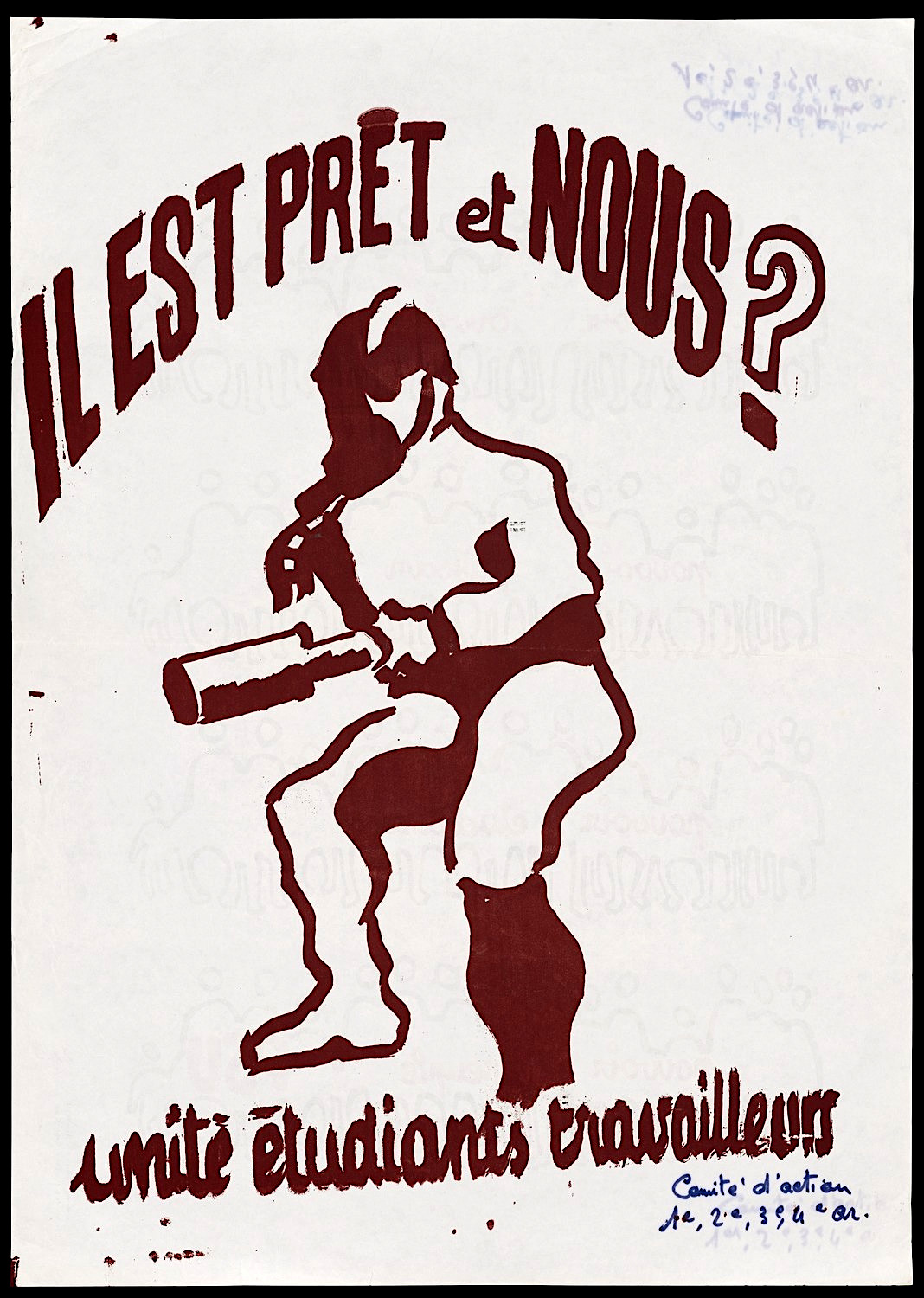 The leftists wanted to rouse the workers to make the Revolution. But when the workers massively joined the movement by going on strike in the greatest general strike in French history, the Communist-led CGT (General Confederation of Labor) succeeded in leading the strike toward negotiations and wage increases.
The leftists wanted to rouse the workers to make the Revolution. But when the workers massively joined the movement by going on strike in the greatest general strike in French history, the Communist-led CGT (General Confederation of Labor) succeeded in leading the strike toward negotiations and wage increases.
For the ultra-lefts, that amounted to a cowardly betrayal by the union leadership. For several years, the most ardent militants, especially the Maoists, tried to relight the flame of revolt by entering factories as ordinary workers.
While scorning the student revolt as petit bourgeois, the Maoists quickly adapted to the mood of revolt, shifting the focus of their Comités de basefrom Vietnam to French society. During the May events, the Comités de Base applied the Maoist theory of creating liberated territories in the periphery, making the revolution in cultural workplaces like schools and libraries. Employees everywhere were going on strike, reorganizing their own work, which often needed it.
Whatever its ideological significance, this tendency of over-managed people to take control of their work lives struck me at the time as the most positive aspect of the May events. A similar aspect was a seemingly spontaneous movement by artists to “serve the people” anonymously.
In the Ecole des Beaux Arts, students produced the posters that symbolized May ’68 even more than the Situationist graffiti. A close friend of mine, who before and after the revolutionary mood of the period strove to make a name for himself as an artist, was overwhelmed and for a while converted by the movement to produce art anonymously, for the pure pleasure of society, without thought of gain or glory.
While the Maoists pursued their cultural revolution and the Trotskyists tried to channel the street battles, political commentators and sociologists flocked to the scene to explain to the rebels what they were rebelling about. It was perhaps all the easier for French students to act out revolution in that they could situate themselves in a long national tradition running from the great revolution of 1789 through 1830 and 1848 to the Paris Commune of 1871. “The Student Commune” was the title of philosopher Edgar Morin’s glowing essay opening the most widely noted of the shelf-load of books that appeared in shops more quickly than the streets could be repaved: La Brèche.
Revolt on the Periphery
While the (CGT) worked to get the workers back on the job before they could be further contaminated, the massive strikes rekindled young intellectuals’ interest in their own working class as a potential “revolutionary subject”. Seen from the vantage point of publisher François Maspéro’s crowded bookstore, La Joie de Lire, in the rue Saint Sévérin, it was clear before May that the contemporary front lines of the world revolution were in the imperialist periphery, in Vietnam or Latin America, and certainly not in France.
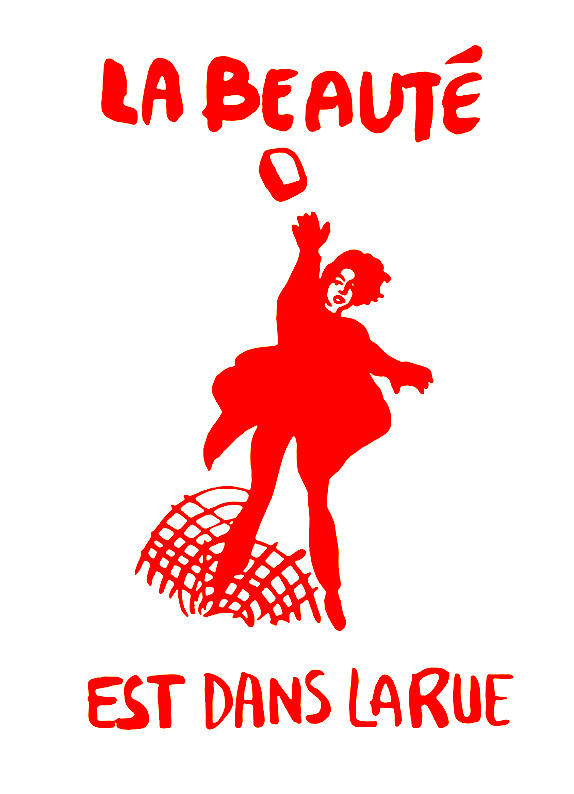 But even as it attracted the attention of the world, the May movement looked inward, turning its back on the Third World in its effort to unfold revolution according to national patterns. Thus began the loss of interest in the Third World that soon ruined Maspéro. (He was targeted for “revolutionary” anarchist shop-lifting, in order to punish him for “exploiting” the subjects he published books about, unlike all those other publishers only interested in making money).
But even as it attracted the attention of the world, the May movement looked inward, turning its back on the Third World in its effort to unfold revolution according to national patterns. Thus began the loss of interest in the Third World that soon ruined Maspéro. (He was targeted for “revolutionary” anarchist shop-lifting, in order to punish him for “exploiting” the subjects he published books about, unlike all those other publishers only interested in making money).
It is significant that La Joie de Lire was sold to Nouvelles Frontières, a budget travel agency. The sixties trips to Algeria, Cuba, China and even California in search of revolutionary models gave way to vacations in warm climates, period.
The philosopher Edgar Morin described May ’68 as an “osmosis” occurring between the “existential libertarian exigency” of some and the “planetary politicization” of the others.
The world seemed to be coming together politically when it was in fact falling apart.
The gauchistes were momentarily united by hostility to the French Communist Party. The leadership of the PCF was clearly convinced that revolution in France was a dangerous fantasy in a NATO member state and discretely worked with de Gaulle’s prime minister Georges Pompidou to restore normal order.
The hatred of French intellectuals for the French Communist Party has been an obsession overflowing political categories. Hatred for the PCF came from right, left, and center. A specialist in the matter, Cornelius Castoriadis, writing under the name of Jean-Marc Coudray in La Breche, explained why: the PCF is “neither reformist nor revolutionary”.
“Prisoner of its past, the Stalinist bureaucratic apparatus is incapable, in France as almost everywhere, of turning the corner that would allow it in theory to play a new role. Not, certainly, a revolutionary role, but the role of the great modern reformist bureaucracy needed for the functioning of French capitalism, which has been recommended to it for years by volunteer advisors, knowledgeable sociologists, and subtle technicians”, Castoriadis wrote.
‘A New Period in Universal History?’
In 1968, both Maoist revolutionaries and budding technocrats saw the youth revolt as a blessed historic opportunity to snatch the working class from the clutches of the PCF. The PCF needed to be destroyed in order “to make the revolution” – or conversely to modernize French capitalism.
“Whatever comes next,” declared Castoriadis, “May ’68 has opened a new period in universal history.”
 This extravagant appraisal of the significance of May ’68 was by no means unusual. The exaltation of May’s spontaneity by established intellectuals was a way of celebrating the relegation of the PCF and its bureaucracy to the ashcan of history.
This extravagant appraisal of the significance of May ’68 was by no means unusual. The exaltation of May’s spontaneity by established intellectuals was a way of celebrating the relegation of the PCF and its bureaucracy to the ashcan of history.
Castoriadis perceived an explosion of creativity, “brilliant, effective and poetic slogans surged from the anonymous crowd.” Teachers were astonished to discover that they knew nothing and their students knew everything. “In a few days, twenty-year olds achieved political understanding and wisdom honest revolutionaries haven’t yet reached after thirty years of militant activity,” he wrote.
Did this stupefying miracle really take place? It was hailed in any case: for, if innocent youth could rise from its tabula rasa and make the revolution, there was obviously no need for a structured organization like the Communist Party.
There was immense joy among intellectuals at discovering a new revolutionary subject close to themselves. Castoriadis announced that in modern societies youth is a category more important than the working class, which has become a dead weight on revolution.
But could spontaneous youth actually make the revolution? Even as he was extolling the glorious “explosion”, Castoriadis pointed to its limits. “If the revolution is nothing but an explosion of a few days or weeks, the established order (know it or not, like it or not) can accommodate itself very well. Even more, contrary to its belief, it has a profound need for it. Historically it is the revolution that permits the world of reaction to survive by transforming itself, by adapting,” he observed. The outcome could be “new forms of oppression better adapted to today’s conditions.”
Indeed, transformation and adaptation ensured that the real economic powers running the world were not seriously disturbed by all this turmoil.
All of this, I readily admit, went right past me at the time. The May events did seem to suggest that sudden, unforeseen changes were possible. That in itself was exhilarating. I watched in some wonderment as the French seemingly decided to make “the revolution”. It was in their tradition, not in mine.
At the same time, I was not happy with May ’68 because the Vietnamese and their struggle were forgotten. Ironically, one reason the French government clamped down so quickly on student activists may have been to prove Paris’ fitness as a neutral and orderly capital for the talks that were opening there between the Americans and the Vietnamese. Nobody paid much attention to those talks, and the war raged on, but in Paris, it was overshadowed by the illusion of an imminent revolution at home.
The Legacy of May ’68
Politically, the May ’68 revolution was rapidly defeated at the polls. The majority of the population turned against the disorder, as is usual in similar cases, especially when no one could see where it was heading. In a snap election in June 1968, the Gaullists won an increased majority, and the French Communist Party won 20% of the vote compared to the 3.9% of votes that went to the only party openly representing the May movement, the PSU (Parti Socialiste Unifié).
Nevertheless, both De Gaulle and the Communists were the historic losers. Whatever else it didn’t do, the May ’68 student generation succeeded in discrediting and undermining existing authority, notably the political authority of De Gaulle and the PCF, and indeed authority itself. The illusion was widespread that spontaneity would undermine the ruling class and overcome consumerism and the “spectacle society.”
On the contrary, the result has been the triumph of the “spectacle society”, the reign of images and financial power – the opposite of what May ’68 seemed to promise at the time.
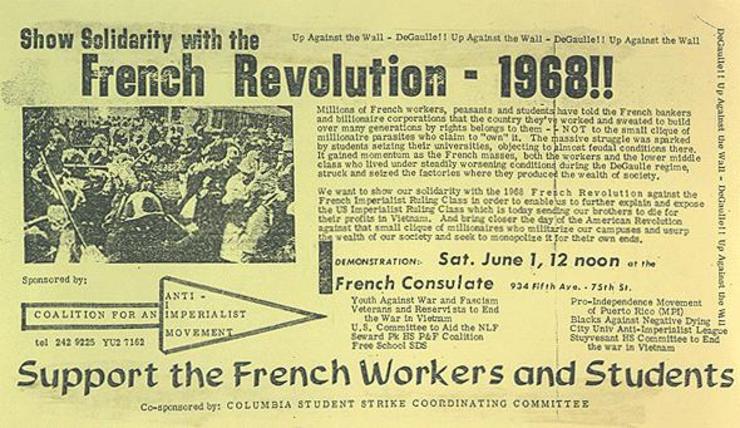
The “sexual liberation” aspect of May ’68 has been exaggerated, as the French were not a puritan people to start with, just discrete. But it helped accelerate an evolution away from the legal imposition of Catholic rigidity, leading to legalization of abortion in 1975.
Many prominent ’68 revolutionaries went on to highly successful careers, especially in communications, evolving into defenders of the liberal Establishment and advocates of humanitarian wars. Cohn-Bendit’s mass media stardom enabled him to convert European Green parties from principled pacifism into support for NATO’s attack on Yugoslavia. For one reason or another, many young people in France today regard May ’68 as the mistaken illusions of their parents.
Since both De Gaulle and the French Communist Party were seen as enemies by the United States, a cui bono suspicion exists (especially among the losers) that May ’68 must have been the result of CIA manipulation. Certainly, the CIA was active against both those forces of resistance to American hegemony and would no doubt have loved to engineer May ’68. It may have tried to nudge things a bit here and there. But engineering such events is a feat beyond the power of even the most ambitious intelligence agency. May ’68 was indeed genuine – but genuinely what?
Top Photo | A young demonstrator holds a red flag and kisses his girlfriend on the barricade built across the street in the vicinity of the Gare de Lyon station during riots in Paris, France on May 23, 1968, as students clashed with police. AP Photo
Diana Johnstone is a political writer, focusing primarily on European politics and Western foreign policy. She received a Ph.D. at the University of Minnesota and was active in the movement against the Vietnam War. Johnstone was European editor of the U.S. weekly In These Times from 1979 to 1990, and continues to be a correspondent for the publication. She was press officer of the Green group in the European Parliament from 1990 to 1996. Her books include Queen of Chaos: The Misadventures of Hillary Clinton, CounterPunch Books (2016) and Fools’ Crusade: Yugoslavia, NATO and Western Delusions, Pluto Press (2002).
Source | Consortium News
The post On the 50th Anniversary of May 1968: Memories of an Illusory Revolution in Paris appeared first on MintPress News.
